House passes legislation to pay retired employees up to $52,000 to return to government service
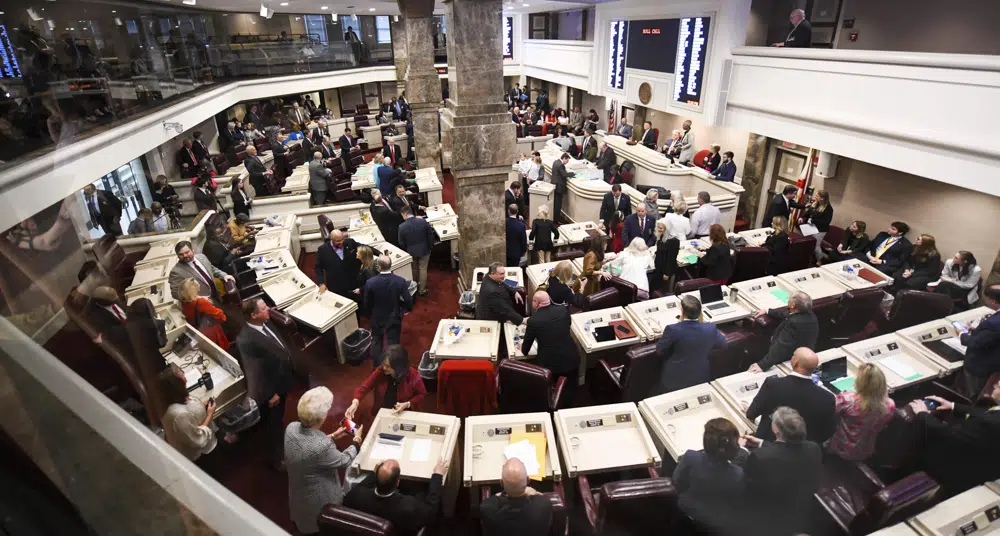
The Alabama House of Representatives passed legislation on Tuesday allowing retired state and local government workers to come out of retirement and return to work for the state or a local government agency, making as much as $52,000 per year while still drawing their state retirement. House Bill 41 (HB41) is sponsored by State Rep. Rex Reynolds. Reynolds explained that state and local retirees who are collecting their Retirement System of Alabama (RSA) benefits can already do this, but the law allowing them to do so capped their compensation at just $30,000. That has risen over time to $37,000. This legislation would raise the amount of money they can be offered to $52,000. “This does not mean that they have to make all of that,” Reynolds explained. “This would apply to law enforcement, corrections, educators, everybody,” Reynolds said. Reynolds acknowledged that there is opposition to this bill. “They want to hire new employees,” Reynolds said. “I am for that too, but the workforce won’t allow that.” Opponents object to a worker retiring, drawing his RSA retirement benefits, and then going back to the state to draw a second check from the state treasury. “They can already do that just by crossing a state line,” Reynolds said. “They are already trained.” Reynolds said that all state agencies are having difficulties recruiting workers in this labor force. HB41 passed the Alabama House of Representatives by a vote of 104 to 0. Reynolds is the retired Huntsville police chief. He chairs the powerful House Rules Committee. The legislation now goes to the Senate, where the bill failed to advance last year. Sen. Sam Givhan has introduced a Senate companion bill. That bill was halted in committee when both budget Chairs, Sen. Arthur Orr and Greg Albritton, blocked the bill from coming out of the Senate Finance and Taxation Committee. They expressed concerns that this could encourage more employees to take retirement, which could cause stress to the state retirement fund and future budgetary complications. Tuesday was the fifth legislative day of the 2023 Alabama Regular Legislative Session. The Alabama Constitution limits the length of a legislative session to no more than thirty legislative days. The unemployment rate is just 2.5%, but Alabama has very low labor force participation. To connect with the author of this story or to comment, emailbrandonmreporter@gmal.com.
Legislature finishes the ARPA special session

On Thursday, the Alabama Senate voted to pass House Bill 1 (HB1), which appropriates $1,060,000,000 in federal American Rescue Plan Act (ARPA) funds for water projects, broadband, healthcare, and other projects. Following Senate passage, the Alabama House of Representatives voted to concur with the changes made by the Senate, and the bill has been sent to the governor. HB1 was sponsored by State Representative Rex Reynolds and was carried by Sen. Greg Albritton. The state has received approximately $2.1 billion in ARPA funding from the federal government. Half of that money has already been appropriated by the Legislative and is in the process of being allocated by the executive branch to projects across Alabama. This second tranche of ARPA money includes about $339,175,000 that will go for healthcare needs, including $25 million for Mental health and $9 million for the expansion of telemedicine. $260 million will be used for broadband, including a cybersecurity component. $395 million will go to water and sewer projects. $55 million will be used to compensate state agencies for the negative impacts of the COVID-19 pandemic. $1,179,000 will go for administrative costs of overseeing and allocating the money. State Sen. Arthur Orr said, “I don’t see what a lot of this has to do with COVID, but I can also see when a train is coming. “We have also got $55 million that can be for food assistance for food banks and nutritional programs,” Orr said. “I appreciate all your hard work on both of these ARPA bills,” Orr said to Albritton. “I think if we never have another ARPA, you would be happy with that.” “It does not fully fund the PEEHIP assistance, which is why the fed passed the original assistance bill,” Orr said. The full Senate voted to adopt the committee amendment introduced Wednesday for Sen. Chris Elliott. Sen. Linda Coleman-Madison offered a floor amendment to the bill. Coleman Madison said, “I would like to know why in-kind contributions was left out. It saves money from contracting out. It saves time. It helps the money go further.” “All of these moneys are under very strict guidelines by the federal Treasury Department,” Albritton said. “If we allow an in-kind contribution that opens up a means of reporting that may become problematic,” Albritton said, “We are talking about the $395 million for water and sewer projects. That is less than 40% of the total ARPA money.” “I ask that you withdraw the amendment,” Albritton said. Coleman Madison said, “I do not want to do anything where the federal government will come back and require a clawback. They want money and not any kind of service. I would like to withdraw my amendment.” Albritton provided a breakdown of the water and sewer dollars in the bill as amended by Elliott’s committee amendment. · $195 million is for water and sewer. · 100 million is water, sewer, and stormwater and may have, but does not require a match. · $100 million in water, sewer, and stormwater and does require a match “Every county in the state will have an opportunity to apply and will actually get funding for a project in their county,” Albritton told the members. “Counties across this state got $495 million directly to counties, and some of them chose to do nothing about stormwater with it,” Senate Minority Leader Bobby Singleton said. “Now they come to us and want us to fix it for them.” State Sen. Rodger Smitherman proposed an amendment to require ADEM to work with a town or county whose application was denied due to an error on the application. “This is simply to help our small towns,” Smitherman said. “If you are in a metropolitan area, you probably have someone who can do this, but our small towns cannot afford that.” “It has already been done,” Albritton objected. “That was in ARPA one. I hesitate to put that language which is already occurring in statute. I am going to vote no on this. We have already added one amendment. I don’t want another amendment one. It raises the possibility of nonconcurrence.” Smitherman’s amendment passed over Albritton’s objection 29 to 1. State Sen. Will Barfoot applauded the members for providing funding for healthcare but urged the members to do more for rural healthcare in the regular session. “I am challenging each of you here to start looking at bills to address healthcare in our rural communities,” Barfoot said. Senate Pro Tem Greg Reed said, “We have to stay focused on rural healthcare.” “We are going to have several pieces of legislation addressing nursing,” Reed said. “A lot of areas in my district, we would not have healthcare if we did not have nurse practitioners.” Reed said that broadband expansion is part of healthcare because of telemedicine. “The technology is advancing tremendously,” Reed said. “That is one way that local hospitals will be able to stay in business. We need to find ways to increase healthcare benefits, particularly in rural places like in my district.” State Sen. Vivian Figures said to Albritton, “Thank you for making sure that the cities and counties that can’t afford to put up a 35% match will be able to do these projects as well.” “I want to thank you for all the work that you have done,” Singleton said to Albritton. “It is a lot of money to spend. We have a lot of needs, but we are beginning to see a difference in the state. We are not going to be able to get it all, but we are knocking a dent in it.” “I wish you could have set aside more of the money for rural hospitals like we did in the first round,” Singleton said. “When that $40 million was cut out for them in the last round, they were ecstatic.” Reynolds asked that the House concur with the Senate changes to HB1. “The second amendment requires that ADEM has to work with a system if an application is denied because of an error,” Reynolds explained. “That system has to have an opportunity to correct that error, and if that application is denied, it has to be
The 2023 Alabama Legislative Session has begun
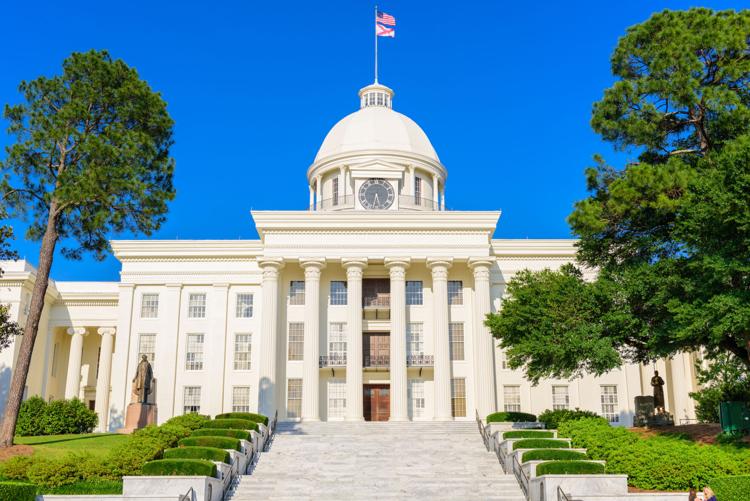
Tuesday, the Alabama State Legislature returned to Montgomery for the start of the 2024 Alabama Regular Legislative Session. The Alabama House of Representatives and the Alabama Senate gaveled in at noon for the first legislative day and then joined the governor that night for a joint session where she presented her state of the state address. Senate Pro Tem. Greg Reed told members of the Senate, “I appreciate you being willing to serve the people of Alabama.” “The sacrifices made by the family of those who serve is not insignificant,” Reed added, thanking the families of the 35 Senators for their sacrifices. The Senate opened the journal to introduce bills, selected a committee to inform the governor that the Senate was now in session, and passed a resolution in honor of March being Women’s History Month. The resolution “celebrates the contribution that Alabama women have made to American history.” The resolution honors a number of Alabama women, including Rosa Parks, Helen Keller, and Condoleezza Rice, for their contributions to the state as well as the governor. “Current governor Kay Ivey is the longest serving woman governor in history and the second after Lurleen Wallace.” State Sen. Rodger Smitherman said, “This resolution inspired me. That resolution is a cosmic picture of the state of Alabama. It does not matter whether you are Black or White. It was a cosmic picture of all the people of Alabama.” “That’s our state,” Smitherman said. “All of us, we represent the state. Look around this room. This is what our state looks like. I am looking forward to voting for this resolution with a smile on my face.” Senate Joint Resolution 4 passed unanimously. Senate Joint Resolution 5 honoring former U.S. Senator Richard Shelby for his decades of service to the state passed. State Sen. Gerald Allen sponsored this. A second resolution supporting the oil and gas exploration by Allen was held over and referred to the Rules Committee after State Sen. Bobby Singleton asked for more time to study it. Reed announced that the Senate needed to address statutory requirements at the start of the session. The Senate held a Legislative Council election and selected Sens. Clyde Chambliss, Steve Livingston, and Vivian Figures to represent the Senate on the Council. For the Committee on Public Accounts, the Senate elected Sens. Arthur Orr, Clay Scofield, and Jabo Waggoner. On the Sunset Committee, Sens. Garlan Gudger, Keith Kelley, and Figures were elected. Sens. Orr, Scofield, Waggoner, Figures, and Singleton were elected to the Senate Ethics and Conduct Committee. Ivey called a special session beginning on Wednesday for the Legislature to focus on appropriating over one billion dollars in American Rescue Plan Act funds that the federal government sent to the state of Alabama. “This evening, I am calling a Special Session of the Alabama Legislature to begin tomorrow so that we can urgently address these endeavors,” Ivey said. “We are, once again, tasked with allocating our taxpayers’ dollars that are part of the second round of the American Rescue Plan Act from Congress.” “This is not free money,” Ivey warned legislators. “And we must invest these one-time funds wisely. Last year, thanks to you, members of the Alabama Legislature, we put these dollars to work, meeting some of Alabama’s biggest challenges. I commit to the people of Alabama we will once again take a smart approach and put it towards major and needed endeavors like expanding broadband access, improving our water and sewer infrastructure, and investing in our health care – including telemedicine.” Tuesday was the first day of the 2023 Alabama Regular Legislative Session, but since Ivey has called a special session, the second legislative day of the regular session will not begin until Tuesday, March 21. The Alabama Constitution of 1901 limits the Legislature to just thirty legislative days in a regular session. Members worked on Tuesday, introducing their bills for the regular session. At the close of the day on Monday, 98 bills had been pre-filed ahead of the session. By the end of the day on Tuesday, that had grown to 174 bills. Reed explained to reporters that it takes a minimum of five legislative days for a bill to pass both Houses of the Legislature, so it will take the rest of this legislative week and next week for the ARPA appropriations bill to pass and go to Gov. Ivey for her signature. Once that is done, the special session can end, and the Legislature will be poised to remove the 2023 Alabama Regular Legislative Session. To connect with the author of this story or to comment, email brandonmreporter@gmail.com.
Spending, school choice among key session issues in Alabama

Alabama lawmakers began the 2023 legislative session on Tuesday. Here are some issues to watch in the session that can last through mid-June: PANDEMIC RELIEF FUNDS Lawmakers are expected on Wednesday to begin a special session on allocating the remaining $1.06 billion in state relief funds from the American Rescue Plan. Lawmakers will take up a proposal that steers money to water and sewer projects, along with broadband and healthcare needs. Republican Sen. Greg Albritton said there have been disagreements among lawmakers “because it is the last batch.” BUDGET SURPLUS The state has a $2.8 billion surplus in the state education budget and no shortage of ideas how to use it. Lawmakers are expected to debate a plan to provide one-time tax rebates. Republican Sen. Arthur Orr, who chairs the Senate education budget committee, said rebates of $200 for single taxpayers and $400 for married couples, with the possibility of more for families with dependents, are under discussion. Lawmakers are also considering permanent tax cuts. House Democrats are pushing to remove the 4% state sales tax on food. Orr said he believes that will be discussed, but likely in a phased-in approach. Pay raises are also expected for education employees. Legislative leaders have also said they intend to be cautious with spending choices, over fears of a potential economic downturn. SCHOOL CHOICE Republican lawmakers are expected to introduce “school choice” proposals that range from providing money to help parents pay for private school to expanding the number of charter schools in the state. The push comes as at least a dozen other conservative states are considering similar legislation in what is emerging as a landmark year for school choice battles. Republican Sen. Larry Stutts, of Tuscumbia, is finalizing a proposal to allow parents to use about $6,000 a year in state tax dollars to send their children to private schools through education savings accounts. “Parents want the ability to choose,” Stutts said. BAN ON ‘DIVISIVE CONCEPTS’ Legislation has again been introduced to ban the teaching of so-called “divisive concepts” about race and gender. It would prohibit anyone in local school systems, state agencies, and public universities from being forced “to accept, acknowledge, affirm, or assent to a sense of guilt, complicity, or a need to apologize” because of their race, gender, or national origin. Similar legislation was introduced last year and drew criticism from educators and others who said it would have a chilling effect on honest classroom lessons and discussions about the nation’s history. IMPACT OF NEW MEMBERS The dynamic at the Alabama Statehouse this year brings an air of unpredictability because of an unusually large number of freshmen. There are 31 new members in the 105-member House of Representatives and six in the 35-member Alabama Senate. The House also has a new leader, following the election of House Speaker Nathaniel Ledbetter. Republicans maintain strong majorities in both the House and Senate. Republished with the permission of The Associated Press.
Nucor Corp. plans $125 million facility, creating 200 jobs in Decatur
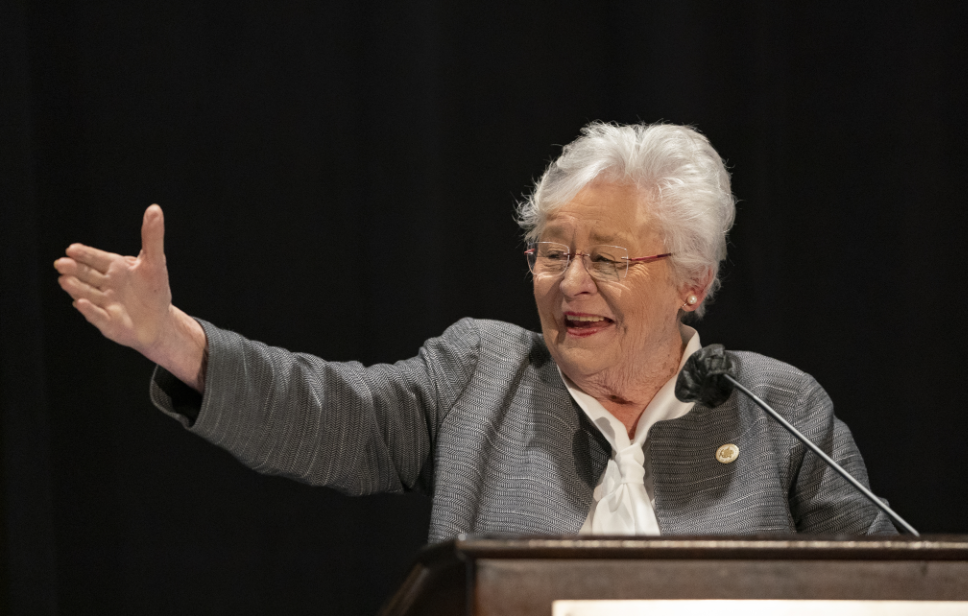
Governor Kay Ivey on Wednesday announced that Nucor Corp. plans to invest approximately $125 million to open an advanced manufacturing facility in Decatur. There, a new business unit – Nucor Towers & Structures, will produce transmission towers. “Alabama offers world-class companies like Nucor all the advantages they need to find success, including a skilled workforce, a pro-business environment, and a solid support system,” said Gov. Ivey. “This investment project is a win for Nucor, Decatur, and all of Alabama.” The new plant will create 200 full-time jobs. The positions will have an average annual compensation of $75,000 and will be filled over a four-year period. Leon Topalian is the Chair, President and CEO of Nucor Corp. “We are very excited to be building this new tower production plant in Alabama, where Nucor has a long history and presence throughout the state,” said Topalin. “As America’s most diverse industrial manufacturer of steel products, we will be able to efficiently supply this new plant, helping to ensure that our nation’s critical energy and digital infrastructure is built with the cleanest, most sustainable steel in the world.” Charlotte, North Carolina-based Nucor already has a strong presence in Alabama. The company established the new business unit after it acquired both Summit Utility Structures LLC and Sovereign Steel Manufacturing LLC in 2022. The new division produces metal poles and other steel structures for utility infrastructure and highway signage. Nucor’s existing facilities in Alabama produce steel, tubular products, joists, and decking, as well as metal buildings. The company has locations in Birmingham, Tuscaloosa, Fort Payne, Eufaula, and Decatur. Economic developer Dr. Nicole Jones told Alabama Today, “Nucor and the steel industry have a long history and presence in Alabama. Nucor’s product lines serve an array of commercial customers in the fields of agriculture, automotive, construction, energy transmission, heavy equipment, infrastructure, transportation, oil & gas, and more. Nucor’s latest expansion, Nucor Towers & Structures, will be an advanced manufacturing facility that makes transmission towers. The company’s capital investment in Decatur will include land improvements, construction of a new building, and manufacturing equipment. The new plant will be located adjacent to the Nucor Steel Decatur sheet steel mill. Greg Canfield is the Secretary of the Alabama Department of Commerce. “Nucor Corp. has a long-standing manufacturing presence in Alabama, and it’s great to see the new Nucor Towers & Structures business unit commence operations in Decatur,” said Sec. Canfield. “Over the years, we’ve developed a strong partnership with Nucor, and I look forward to seeing our relationship expand with this new venture.” The new plant in Alabama will be highly automated. The factory will utilize efficient straight-line production and will also include advanced hot-dip galvanizing operations. Laurent De Mey is the General Manager of Nucor Towers & Structures. “We appreciate the support we have received from the state and local officials in Alabama, including Governor Ivey, the Alabama Department of Commerce, the State of Alabama State Industrial Development Authority, Morgan County Economic Development Association, Morgan County Economic Development Cooperative District, Morgan County, Decatur Industrial Development Board, City of Decatur, Decatur-Morgan County Chamber of Commerce, Hartselle Chamber of Commerce, and the Tennessee Valley Authority,” said De Mey. “We are excited to launch our expansion of this new Nucor business in the State of Alabama.” “The direct and indirect jobs resulting from Nucor’s expansion will provide significant economic benefits for Decatur, Morgan County, and our entire state,” Jones said. State Senator Arthur Orr serves as chairman of the Morgan County Economic Development Association. “It is a true vote of confidence in our community when an existing business decides to further expand its operations here. Our people are our strength in Morgan County,” said Sen. Orr. “We are grateful for the excellent job they do for employers like Nucor and others across the area.” Ray Long is the chairman of the Morgan County Commission. “This is a great company with a great reputation for working with us to make Morgan County a better place to live,” said Chairman Long. “We look forward to working with them to make sure this venture is successful,” said Long. “We are also thankful for the approximately $125 million investment and the 200 jobs created with a compensation of around $75,000,” said Decatur Mayor Tab Bowling. “Our local economic development office, along with its numerous partners, continue to work hard to bring new industries and quality jobs to Decatur. This is a prime example of that work.” “Metals and advanced materials are one of our state’s targeted business sectors,” Jones explained. “Alabama Department of Commerce data from 2021 shows primary metal manufacturing exports valued at approximately $1.3 billion, and fabricated metal manufacturing exports valued at $453 million.” To connect with the author of this story or to comment, email brandonmreporter@gmail.com.
Gov. Kay Ivey issues rules for responding to public record requests
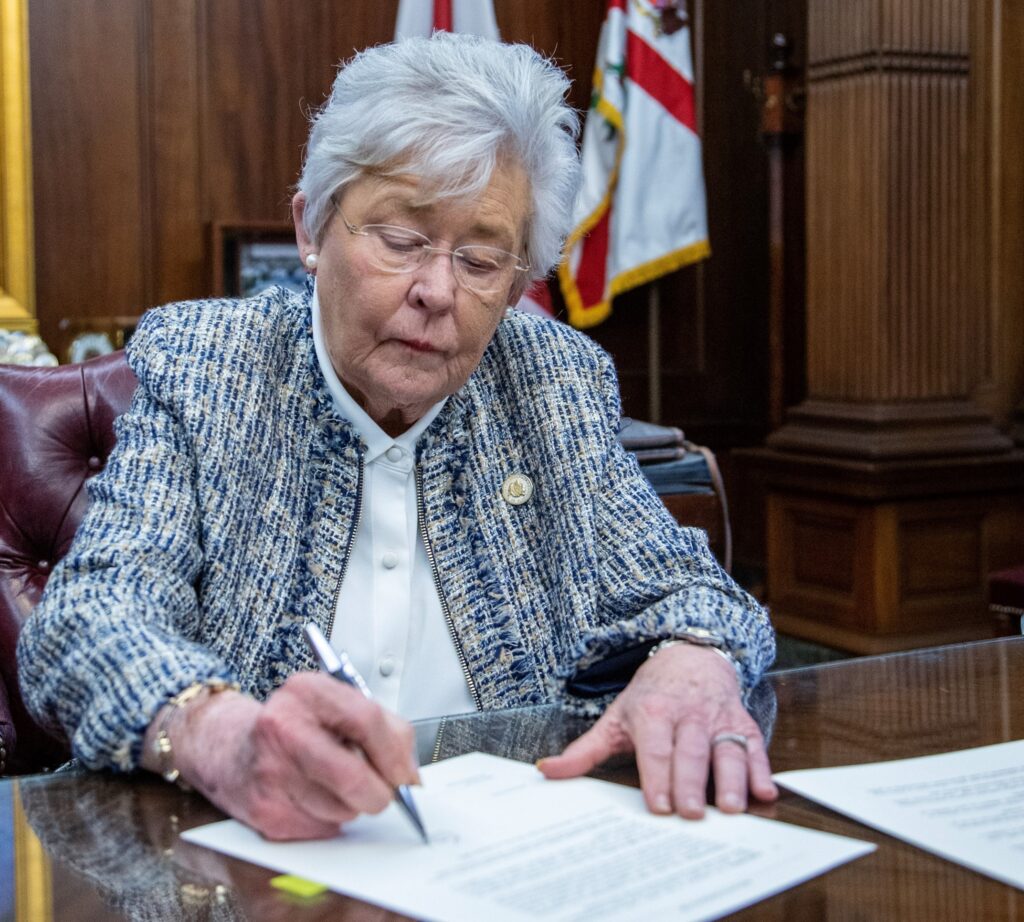
Alabama Gov. Kay Ivey on Thursday ordered state agencies to follow new procedures for responding to public record requests, changes intended to provide structure in a state with one of the weakest open records laws in the country. Ivey signed an order instructing executive-branch agencies to: establish a portal for requests; respond within 15 days for a simple request or 45 days for a more complicated request; and limit fees to $20-per-hour for preparation time and 50 cents per page for paper copies. “Access to public records is essential to guaranteeing transparency in government, and I am proud to sign this executive order that improves this process as a whole,” Ivey said in a statement. However, the order only applies to executive-branch agencies and does not address an appeal process or the exemptions that have been used to deny requests. Alabama’s public records law says any citizen has the right to inspect and take copies of public writings, except for those exempted by law. However, it does not provide deadlines for responses or an enforcement mechanism beyond filing a lawsuit. A 2007 comparison of state open records laws conducted by the Better Government Association and the National Freedom of Information Coalition ranked Alabama at the bottom of the nation. While the review gave 38 states, including Alabama, an “F” grade, Alabama tied for last place in the comparative rankings. Felicia Mason, executive director of the Alabama Press Association, said the executive order is a step forward. Mason said many state laws provide remedies to pursue if a request is denied, and most address response requirements and possible fees. “We applaud the governor’s executive order, which provides a minimum response time as well as addressing the fees charged for obtaining the records,” Mason wrote in an email. State Sen. Arthur Orr, who has previously tried to overhaul the open records law, said he also welcomed the governor’s efforts. Orr, a Republican from Decatur, Alabama, said he will introduce legislation in the upcoming session to include other government entities. “I certainly applaud the governor’s efforts to bring more transparency to state government. However, the work must continue with city and county level governments to complete the circle,” Orr said. Republished with the permission of The Associated Press.
Kay Ivey issues rules for responding to public record requests

Alabama Gov. Kay Ivey on Thursday ordered state agencies to follow new procedures for responding to public record requests, changes intended to provide structure in a state with one of the weakest open records laws in the country. Ivey signed an order instructing executive-branch agencies to: establish a portal for requests, respond within 15 days for a simple request or 45 days for a more complicated request, and limit fees to $20 per hour for preparation time and 50 cents per page for paper copies. “Access to public records is essential to guaranteeing transparency in government, and I am proud to sign this executive order that improves this process as a whole,” Ivey said in a statement. However, the order only applies to executive-branch agencies and does not address an appeal process or the exemptions that have been used to deny requests. Alabama’s public records law says any citizen has the right to inspect and take copies of public writings, except for those exempted by law. However, it does not provide deadlines for responses or an enforcement mechanism beyond filing a lawsuit. A 2007 comparison of state open records laws conducted by the Better Government Association and the National Freedom of Information Coalition ranked Alabama at the bottom of the nation. While the review gave 38 states, including Alabama, an “F” grade, Alabama tied for last place in the comparative rankings. Felicia Mason, executive director of the Alabama Press Association, said the executive order is a step forward. Mason said many state laws provide remedies to pursue if a request is denied, and most address response requirements and possible fees. “We applaud the governor’s executive order, which provides a minimum response time as well as addressing the fees charged for obtaining the records,” Mason wrote in an email. State Sen. Arthur Orr, who has previously tried to overhaul the open records law, said he also welcomed the governor’s efforts. Orr, a Republican from Decatur, Alabama, said he will introduce legislation in the upcoming session to include other government entities. “I certainly applaud the governor’s efforts to bring more transparency to state government. However, the work must continue with city and county level governments to complete the circle,” Orr said. Republished with the permission of The Associated Press.
Steve Flowers: Legislature organizes for Quadrennium

The legislature had their every four-year organizational session earlier this month. It is exactly what the title states. They are organizing for the next quadrennium of lawmaking. They officially chose their leadership and adopted the rules for the two chambers. The 105-member House of Representatives and 35-member State Senate are elected for four-year terms, the same as the governor and other constitutional offices. However, unlike the governor, who was sworn in on Monday, January 16, as set out in the state constitution, the legislature takes office the day after they are elected in November. The state House of Representatives will have 77 Republicans and 28 Democrats. That is a veto-proof, bulldozer-shoving, anything-you-want supermajority. The Democrats have very little say with those overwhelming numbers. Two days after they were elected in November, the 77-member Republican majority met in a private caucus meeting in Montgomery and selected their leadership. Therefore, the vote for Speaker of the House two weeks ago was simply a formality. The House has chosen Representative Nathaniel Ledbetter to be the Speaker of the House. Speaker Ledbetter hails from Rainsville in DeKalb County. He is a former Mayor of Rainsville. He has only been in the House of Representatives for eight years, having been first elected in 2014. He was chosen to be the majority leader in the House in his freshman year. He was close to the former Speaker Mac McCutcheon, and he served on both the powerful agenda-setting Rules Committee, as well as the Ways and Means Education Budget Writing Committee. Representative Chris Pringle of Mobile has been chosen to be Speaker Pro Tem of the House, which is the second highest position within the body. He has served previously for 16 years in the House from the Port City. He succeeds fellow Mobilian Victor Gaston in this post. There are two young stalwarts who will be serving in Republican Party positions within the House. Representative Scott Stadthagen of Decatur will be the new House Majority Leader. Representative Wes Kitchens of Arab will serve as the Republican Leadership Caucus Vice Chair. Representative Debbie Wood from the Valley will serve as the Republican Caucus Secretary/Treasurer. The three most powerful posts in the House are the chairmanships of the two money committees and the agenda-setting Rules Committee. Representative Danny Garrett of Trussville in Jefferson County will continue to Chair the Ways and Means Education Budget Committee. Representative Rex Reynolds of Huntsville will be the General Fund Ways and Means Chairman. Reynolds replaces longtime Ways and Means Chairman Steve Clouse of Ozark. Representative Joe Lovvorn of Auburn will be the new Rules Committee Chairman. Representative Jim Hill of St. Clair will chair Judiciary. He is a former circuit Judge and a veteran of the House. All of these House leadership positions are held by Republicans. To the victor goes the spoils. The Democrats have a veteran and sterling team heading their Caucus Leadership in the House. Anthony Daniels of Huntsville will be the Democratic Minority Leader. Barbara Drummond of Mobile will be the Caucus Chair. Mary Moore of Birmingham will be the Vice Chair, and Kelvin Lawrence of Hayneville will be Secretary/Treasurer of the Democratic Caucus. The 35-member Alabama State Senate returns almost intact with their continuity and quality leadership. They will dominate and provide a stable State of Ship to help lead the state. Republicans control this upper chamber to the same degree that the GOP members do in the House. Republicans outnumber Democrats 28 to 7 in the Senate. State Senator Jabo Waggoner of Jefferson County begins his 50th year in the legislature. This is a state record. He is definitely destined for the state history books. Jabo will continue to Chair the powerful Rules Committee. Greg Reed of Walker County will be Pro Tem of the Senate again. The Majority Leader will again be Clay Scofield of Marshall County. The two money committee chairmen will continue to be in charge of how the state revenues are spent. Senator Arthur Orr of Decatur will chair Finance and Taxation/Education. Senator Greg Albritton of Escambia will chair Finance and Taxation/General Fund. These two men will be very powerful. Popular state Senator Will Barfoot of Pike Road will chair Judiciary in the Senate. Senator Clyde Chambliss of Prattville has become a stalwart leader in the Senate. He will be Majority Whip. Lieutenant Governor Will Ainsworth presides over the Senate. The Regular Session begins in early March. See you next week. Steve Flowers is Alabama’s leading political columnist. His weekly column appears in over 60 Alabama newspapers. He served 16 years in the state legislature. Steve may be reached at www.steveflowers.us.
Kay Ivey meets with legislative budget chairs
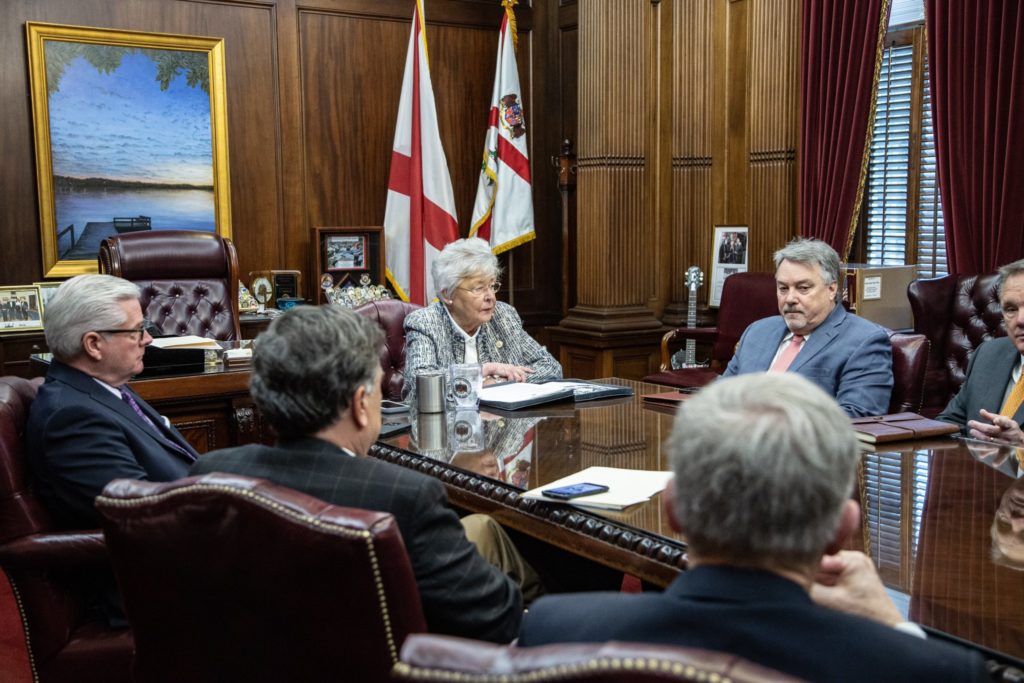
Gov. Kay Ivey met with legislative leaders on Wednesday to discuss the 2024 budgets and potential 2023 supplemental appropriations. “Today, we had our first meeting of the new term with our legislative budget chairs,” said Gov. Ivey. “How we budget will affect Alabamians for decades to come, and this group of leaders is committed to ensuring we will continue taking a fiscally conservative approach to our budgets.” Republicans have commanding control of Alabama state government, so all of the legislative leaders at Wednesday’s meeting were members of the GOP. They include new Speaker of the House Nathaniel Ledbetter, new Chairman of the House Ways and Means General Fund Committee Rex Reynolds, Chairman of the House Ways and Means Education Committee Danny Garrett, Ivey’s Director of Legislative Affairs Drew Harrell, State Finance Director Bill Poole, State Senate Finance and Taxation General Fund Committee Chairman Greg Albritton, State Finance and Taxation Education Committee Chairman Arthur Orr, and Senate Pro Tem. Greg Reed. Legislative Service Agency Fiscal Division Director Kirk Fulford, the Pro Tem.’s chief of staff Derek Trotter, and other staff members were also present. “Yesterday the Leadership of the House and Senate, and the Budget Chairman’s met with Governor Ivey, Director Poole and staff,” Reynolds said on social media. “The Governor engaged the meeting with direct questions related to our economy, our workforce, and the services the state provides to Alabamians.” The big-budget question hanging over the coming legislative session is what to do with the budget surplus. The state had over a billion dollar surplus left over from fiscal year 2022, which ended on September 30 that rolled into fiscal year 2022. Alabama has an arcane budgeting system where education goes into one budget – the education trust fund budget (ETF) for education spending and the state general fund (SGF) for non-education-related expenditures. Last year, the ETF for FY2023 passed by the Legislature was $8.26 billion – $589 million more than FY2022. The SGF for FY2023 passed was $2.74 billion – $53 million more than FY2022. Both are all-time records. The state’s reserve funds are already flush with funds from four straight years of conservative budgeting. With wages rising and the number of workers employed at an all-time high, the state is likely to take in more than the $11 billion the Legislature expected in FY2023 – the current budget year. The Legislature has some hard choices to make when the 2023 regular legislative session begins on March 7. They likely will have significant surplus funds left over for supplemental appropriations in FY2023 – they had over a billion dollars in supplementals in FY2022. Leaders could increase state spending, rebate surplus dollars to the taxpayers in one-time checks, or lower taxes in FY2024. Orr said that the Legislature may rebate up to $500 million back to taxpayers later this year. Another major issue facing the budget committees is what to do with all the American Rescue Plan Act (ARPA) money that the state is getting from the federal government – albeit with many federal strings attached. The second $one billion of that money has to be appropriated. The Governor will formally make her FY2024 budget requests on Tuesday, March 7, when she makes her state of the state address to a joint session of the Alabama Legislature at the historic 1859 Alabama Capitol Building. To connect with the author of this story, or to comment, email brandonmreporter@gmail.com.
With budget surplus, Alabama lawmakers consider tax rebates

Alabama lawmakers are eyeing possible tax rebates as the state sees a budget surplus of more than $2.7 billion. Legislators will face decisions on what to do with the rare surplus, including how much to save and how to spend the rest. The state budget that funds education has a $2.7 billion surplus, according to the Legislative Services Agency. The state general fund has a smaller surplus of $351 million. Sen. Arthur Orr, who chairs the Senate education budget committee, said lawmakers are working with Gov. Kay Ivey on a proposal but that he expects the plan to include rebate checks to taxpayers, along with tax cuts and putting money in reserves. “We believe, after we take care of state government, at least on the education side, we have enough to send back to the people of Alabama who sent it to us in the first place. In addition to that, with the economy and with inflation, they’re struggling, and so this would be a small manner of relief to them,” Orr said. He said lawmakers are considering $500 million in total rebates. The amount sent back to Alabamians will depend on how eligibility is defined, but he said they are looking at a minimum of $200 or $250 for individuals and $400 or $500 for married couples who file joint returns. The Republican lawmaker said he also expects proposals for tax cuts. But he said it is important that the state put a significant amount of money into reserves. “I think everyone realizes this is a one-time phenomenon having a surplus like this, and we need to put money back because the economy is getting tighter and tighter.” The Associated Press reported in August that at least 15 states have approved one-time rebates from their surpluses. There has been disagreement among lawmakers on how to use the rare surplus. “If we could do a tax rebate, we could expand Medicaid,” Senate Minority Leader Bobby Singleton said when asked about the rebate proposal. “I think that is something more substantial than doing a tax rebate. I think the citizens would get more out of an expansion of Medicaid than they would a one-time check to be able to spend.“ Alabama is one of only 11 states that did not expand its Medicaid program under the Affordable Care Act to provide health care coverage to low-income people, according to the Henry J. Kaiser Family Foundation. Democratic lawmakers in Alabama have long called for Medicaid expansion, arguing it would bring health care coverage to more than 300,000 people, many of them in working families who don’t have health insurance through their jobs. Republicans, who hold a lopsided majority in the Alabama Legislature, have so far opposed expansion. Sen. Greg Albritton, who chairs the Senate general fund budget committee, said he wants to make sure the state has enough in reserves so it won’t face budget cuts during an economic downturn. “The first priority is getting ready for hard times. I don’t know how bad, or if, a recession will occur, but my job is to try to make sure that we are prepared as we possibly can,” Albritton said. Albritton said rebates will “be on the table.” But added he would like to see the state put the education surplus in a trust to fund scholarships. “I think that would be a better return to the taxpayers than a simple rebate,” he said. Republished with the permission of The Associated Press.
Rick Chandler: Big money & Alabama politics

Another month and another pile of money has been delivered to Alabama’s incumbent political figures. Whether they need it or not, there are a number of organizations that gleefully throw money at Alabama’s politicians out of the goodness of their hearts, or more likely, it is because they are looking to secure favorable future decisions from those same politicians. During September, my Republican opponent, Author Orr, was “gifted” another $17,250 to bring the total amassed in his campaign war chest to almost one million dollars ($982,732). Of that latest monthly total, $5,000 came from Cook’s Pest Control, a company my opponent is employed by as the Executive Vice President. Customers should be comforted that their monthly pest control fees have provided a surplus to the company sufficient to allow for such a generous donation. What makes the situation even more absurd is that there were actually zero expense dollars paid out of this account during the month of October. The candidate is obviously confident that his Libertarian opponent has absolutely no chance of unseating him. So, the need to continually amass large sums of money each month would not appear to be necessary, unless there are bigger political plans down the road. The previous month’s haul of $22,000, plus the other months in the 2022 election year, have netted my opponent a total of $235,392 thus far. This money madness is, of course, not just limited to my opponent. For example, Kay Ivey raked in a staggering $316,011 just during the month of September, and Will Ainsworth has a ridiculous $1,268,371 in his campaign war chest. This reflects the unfortunate situation of Alabama politics. A culture where lobbyists, special interest groups, and PACs continue to exert massive influence over our political leaders to the detriment of our economy, our educational system, and our basic freedoms as Americans. The process should focus more on the candidate’s positions and plans for leading the state. The current system discourages fairness, and it is shown repeatedly when incumbent candidates refuse to engage in debates and explain their visions to the voters because they will simply outspend their opponents in advertising and at various political functions. Alabama is one of the few “special” states that allow unlimited contributions from individuals, their state parties, PACs, corporations, and unions. It doesn’t have to be this way, however. Most other states enforce donation limits by source, and thereby introduce a certain level of fairness in the election process. For instance, Alaska limits an individual’s contributions to a maximum of $500 per candidate per year. They also limit the aggregate total of contributions from non-resident donors. Arkansas limits the amounts a candidate’s state party can donate to $2,700 per election. Georgia limits PAC contributions for state-wide candidates to $7,600 for primary/general elections and $4,500 for runoffs, and for legislative candidates there is a PAC limit of $3,000 for primary/general elections and $1,600 for runoffs. Mississippi imposes corporate campaign limits of $1,000 per candidate per year. Kentucky prohibits any contributions from unions. Again, Alabama imposes no limits that politicians can receive from any of these sources. While not all politicians are blatantly corrupt, there is most definitely an expected behavior for those officeholders who have willingly accepted large sums of money as part of the campaign process. If just a few political newcomers, like the current crop of Libertarian candidates who receive little to no campaign donations, succeed in getting elected in Alabama in November, it could ignite a new fervor of political interest by the entire voting population. New faces without any financial ties to legacy power brokers would provide a badly needed jolt and drastically shake up the current big-money monopoly. This fresh start could make for a new political landscape, and would significantly improve on the sad 25% voter participation rate we have seen in the last round of elections. God bless America, and God bless Alabama. Rick Chandler is the Libertarian candidate for Alabama State Senate District 3. Alabama State Senate District 3 includes Morgan County, Southwestern Madison County, and Southeastern Limestone County.
Kay Ivey promises tax relief for citizens if given a second term
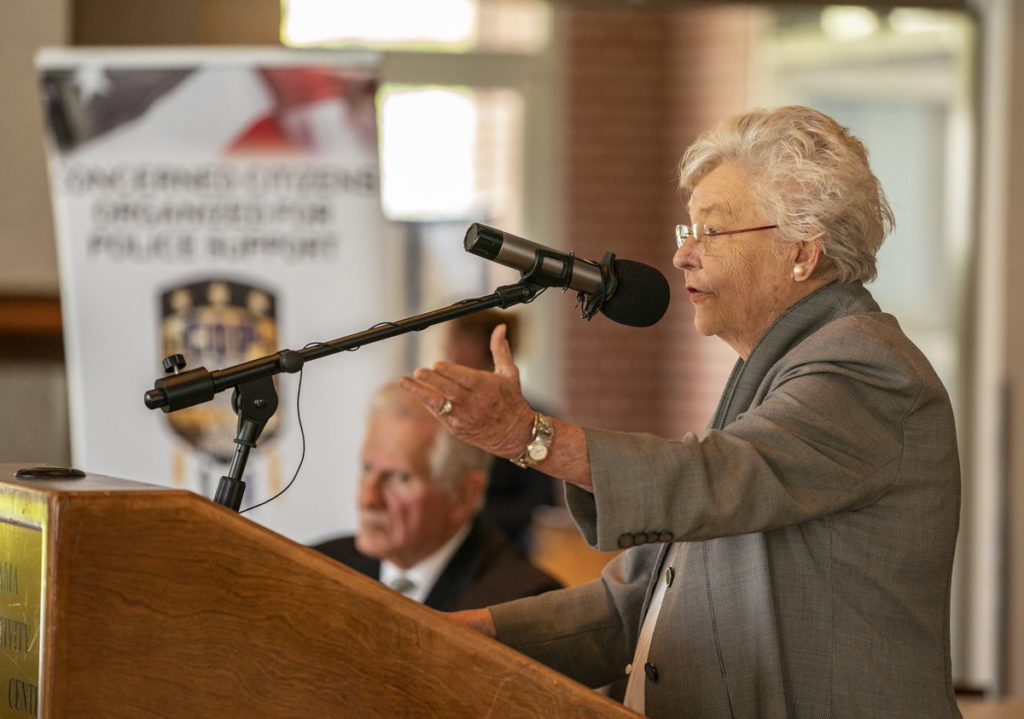
Governor Kay Ivey addressed the Kiwanis Club of Montgomery on Tuesday. In addition to the Governor’s normal talking points she added support for “providing tax relief in the pocket books of Alabamians.” The Governor did not go into detail and did not say whether she favored one-time tax rebates out of the state budget surplus or tax reform to lower the income tax rate or reduce the four percent tax on groceries. A number of key legislators have already suggested that tax rebates or tax would be seriously considered during the 2023 Alabama regular legislative session. The state is expected to carry over a surplus in excess of $2 billion into the 2023 fiscal year which begins on October 1. Sen. Arthur Orr has proposed rebating a portion of that excess money back to the taxpayers rather than using it to grow the government. Some ultra-conservatives have suggested going farther than just a tax rebate and have advocated for passing substantive tax cuts. The State of Alabama collects a five percent income tax on all income, active or passive, in the state except on pensions. Florida, Georgia, Tennessee, and Mississippi have all either have no state income tax or have moved to reduce their taxes while Alabama has stayed at 5%, though the legislature has increased the standard deduction that every citizen is allowed to take. Tax relief could take the form of further increasing the standard deduction helping all taxpayers equally, but on a percentage basis would greatly help the working poor and low wage earners. A reduction in personal or corporate income tax rates would similarly help all taxpayers; but would much more greatly benefit high income Alabamians. Tax reform has become a general election campaign issue. Libertarian nominee for Governor Dr. James “Jimmy” Blake is campaigning on reducing or eliminating the income tax. Democratic nominee for Governor Yolanda Rochelle Flowers has campaigned on eliminating the four percent tax on groceries. Flowers has also voiced support for a suspension in gas tax collections. After learning of Gov. Ivey’s support for tax relief for Alabama taxpayers Dr. Blake told Alabama Today, “I will take credit for that.” The general election is not until November 8. The 2023 regular legislative session will not even begin until March so it could be many months before Alabamians can expect any actual tax relief from the legislature if it passes the legislature. Ivey was the keynote speaker at the Kiwanis Club of Montgomery meeting to honor Sr. Trooper TerMarlon Blair of the Alabama Law Enforcement Agency’s Highway Patrol Division as the club’s Trooper of the Year for 2022. To connect with the author of this story, or to comment, email brandonmreporter@gmail.com.


